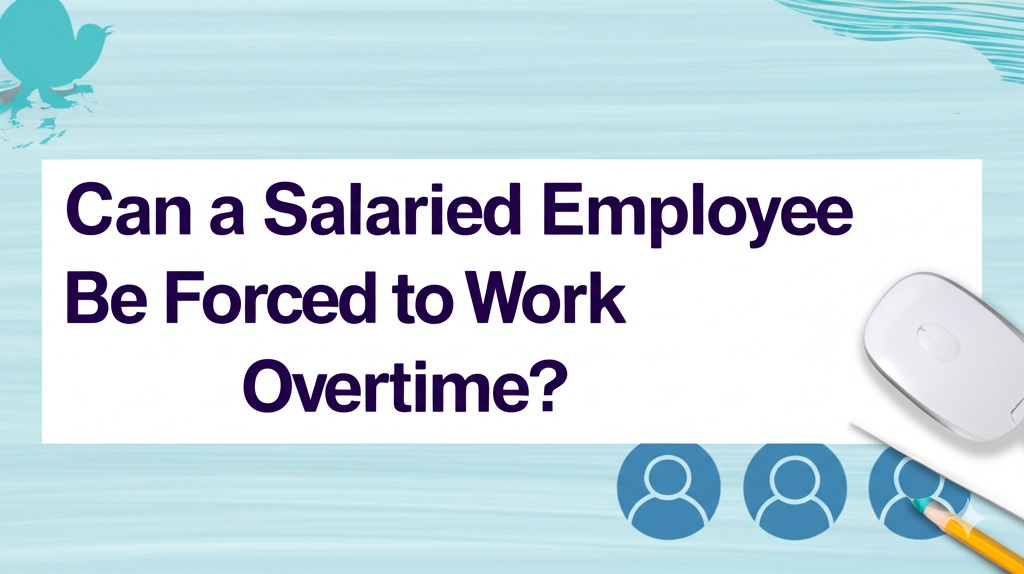
Working long hours might seem like part of the job for many salaried professionals, but when does it cross the line? Can your employer legally require you to work overtime if you’re on salary? This question stirs concern across many industries, especially among employees unsure of their rights.
In this article, we’ll break down what being “salaried” actually means, how overtime laws apply, and what your legal rights are when your boss asks you to put in extra hours.
Understanding What “Salaried” Really Means
Before diving into overtime, it’s important to understand what being salaried entails.
What Is a Salaried Employee?
A salaried employee is typically paid a fixed amount regardless of the number of hours worked in a week. Unlike hourly workers, their compensation isn’t directly tied to the hours they clock in.
However, salary alone doesn’t exempt an employee from overtime laws. This distinction is key when discussing legal requirements around working extra hours.
Federal Overtime Laws: The FLSA
The Fair Labor Standards Act (FLSA) is the federal law that governs minimum wage and overtime requirements in the U.S.
Exempt vs. Non-Exempt Employees
Under the FLSA, employees fall into two categories:
- Exempt employees: Not entitled to overtime pay. These are usually professionals, executives, or administrative workers who meet specific criteria.
- Non-exempt employees: Entitled to overtime pay (usually time and a half) for hours worked beyond 40 in a workweek.
Being salaried does not automatically make you exempt. The nature of your job duties and your salary level both play a role in determining your exemption status.
2024 FLSA Salary Threshold (Updated)
As of 2024, to qualify as exempt under the FLSA, an employee must:
- Earn at least $684 per week (equivalent to $35,568 per year)
- Perform specific executive, administrative, or professional duties
If you’re salaried but don’t meet both criteria, you may still be entitled to overtime pay.
Can Employers Force Salaried Employees to Work Overtime?
Yes — But With Conditions
Legally, employers can require salaried employees to work overtime. However, whether they’re required to pay for that overtime depends on your exempt or non-exempt classification.
Here’s a breakdown:
- Exempt employees: Can be required to work overtime without additional pay.
- Non-exempt salaried employees: Must be paid overtime if they work more than 40 hours per week.
So, if you’re exempt, your employer can ask you to work 50, 60, or even more hours a week — and not owe you anything more than your regular salary.
Common Misconceptions About Salaried Work and Overtime
“I’m salaried, so I don’t get overtime.”
Not necessarily. Many salaried employees are non-exempt, which means they are eligible for overtime pay.
“Overtime laws don’t apply to my industry.”
While some professions are exempt from overtime rules (e.g., certain tech roles, sales, or transportation), the majority of private-sector employees are covered under the FLSA.
“My employer gives comp time instead of overtime pay.”
Comp time (time off instead of overtime pay) is generally not allowed in the private sector for non-exempt employees. It’s more common — and legal — in public sector jobs.
What to Do If You’re Being Overworked Without Overtime Pay
If you’re putting in long hours and not getting compensated fairly, you have options:
1. Clarify Your Exemption Status
Ask HR or review your job description to determine whether you’re exempt or non-exempt. The U.S. Department of Labor also provides tools to help evaluate your classification.
2. Track Your Hours
Keep a personal record of your work hours. If a dispute arises, this documentation can be critical.
3. Discuss Concerns With Your Employer
Sometimes, employers simply aren’t aware of the rules. Bring up your concerns respectfully and request clarification.
4. File a Complaint
If you’re being denied rightful overtime pay, you can file a complaint with the Department of Labor or consult an employment attorney.
Exceptions and State Laws to Keep in Mind
In addition to federal regulations, state labor laws may offer even stronger protections.
For example:
- California has stricter overtime laws and higher salary thresholds for exemption.
- New York has its own wage and hour standards, which can differ from federal rules.
Always check your state’s Department of Labor website for more localized guidance.
Final Thoughts: Know Your Rights
Being salaried doesn’t give employers a free pass to demand endless hours without extra pay. Whether or not you can be forced to work overtime — and paid for it — depends on your exemption status.
Key takeaways:
- Salaried ≠ exempt
- Exempt employees can be required to work overtime without extra pay
- Non-exempt salaried employees are entitled to overtime pay
- State laws may offer additional protections
If you’re unsure about your classification, it’s worth taking a closer look. Understanding your rights is the first step toward fair treatment in the workplace.

Andre Cuevas provides career insights, job search strategies, and professional advice to help individuals navigate the job market and achieve their career goals.






